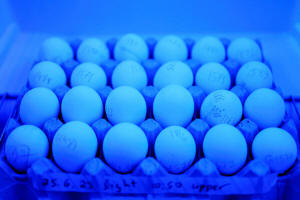|
All
the chicks are female at Yuval Cinnamon’s laboratory in central
Israel, where new technology offers an answer to what he calls
“the most devastating animal welfare issue worldwide - the
culling and sorting of day-old male chicks”.
Day-old male chicks are normally "either macerated or suffocated
or electrified. In some countries they do not even bother to
cull their males properly,” explained Cinnamon, principal
investigator at Israel’s Volcani Institute, which works to
attain food security and food safety.
Cinnamon said that his team has generated a sex-linked genetic
trait that stops the development of male embryos shortly after
eggs are laid.
“We take these eggs and activate the genetic trait using
blue-light illumination which immediately causes the males to
stop developing. The females don’t carry the trait and are
entirely non-genetically modified, as are the table eggs they
lay,” explained Cinnamon.
The unhatched male eggs can be used for other purposes such as
animal feed.
Yaarit Wainberg, CEO of Poultry by Huminn, which is licensed to
commercialize the research, wants to bring the technology to
hatcheries worldwide.
“We are in advanced talks with layer genetics companies and can
see our solution on the market within two years. It will solve a
major problem for the industry.”
(Reporting and writing by Hannah Confino; Editing by Ari
Rabinovitch)
[© 2023 Thomson Reuters. All rights
reserved.] Copyright 2022 Reuters. All rights reserved. This material may not be published,
broadcast, rewritten or redistributed.
Thompson Reuters is solely responsible for this content.

|
|




